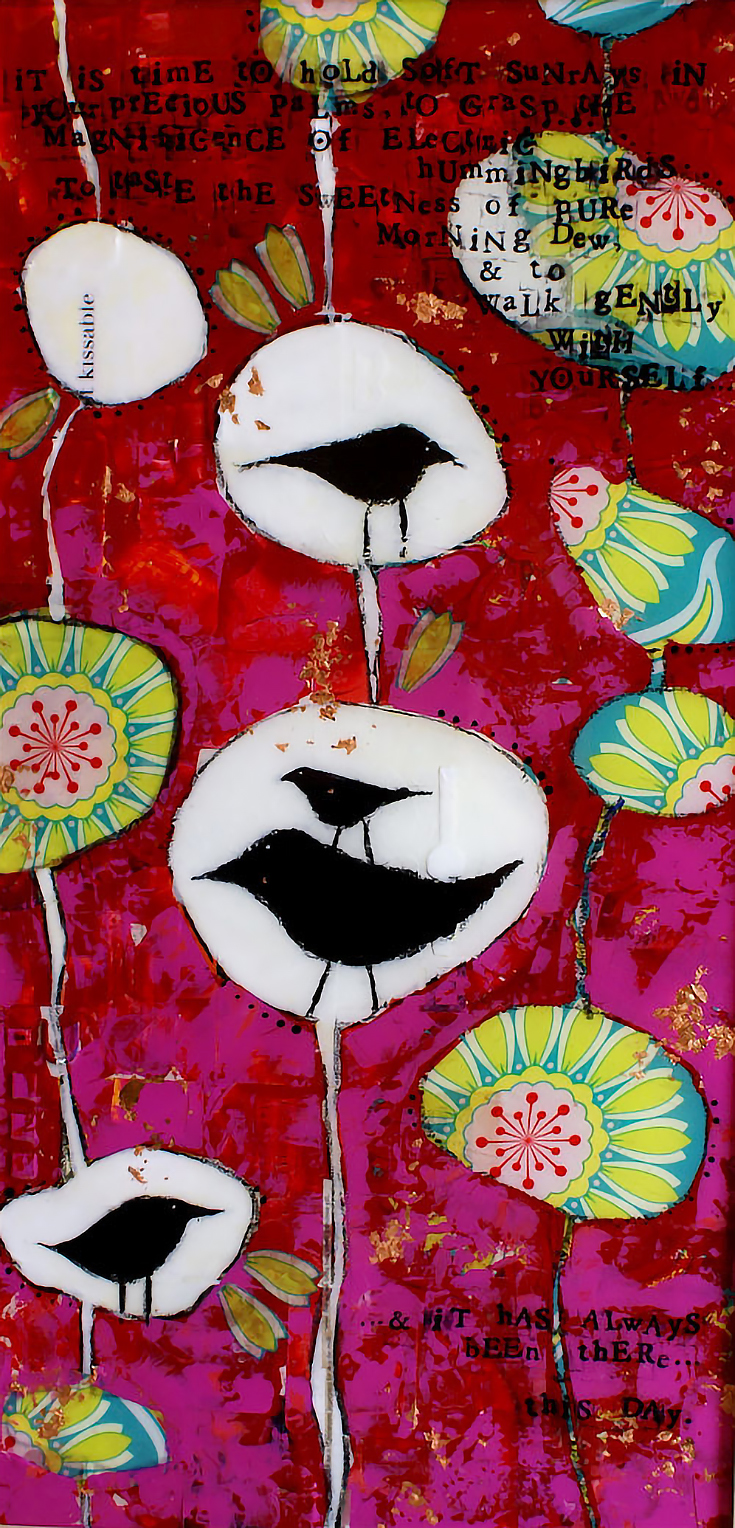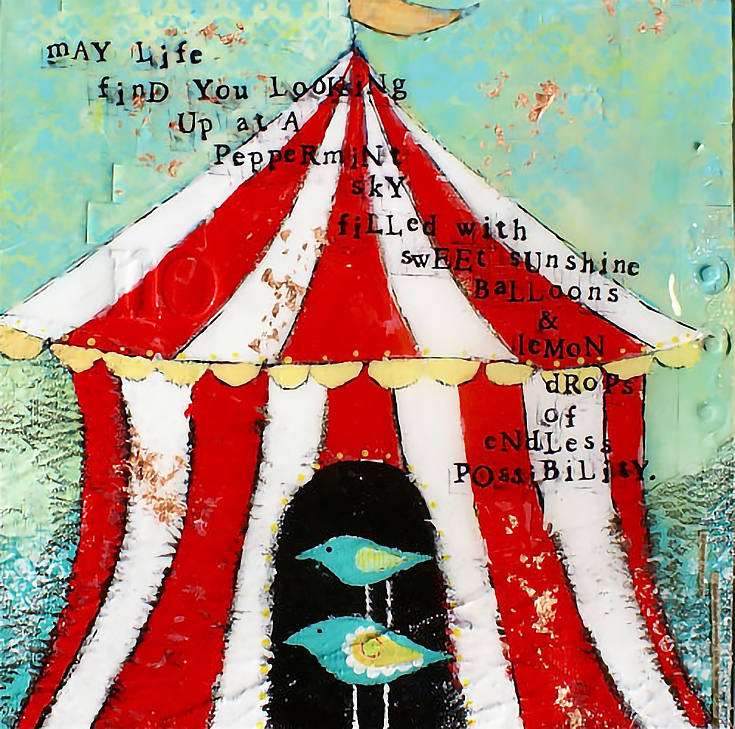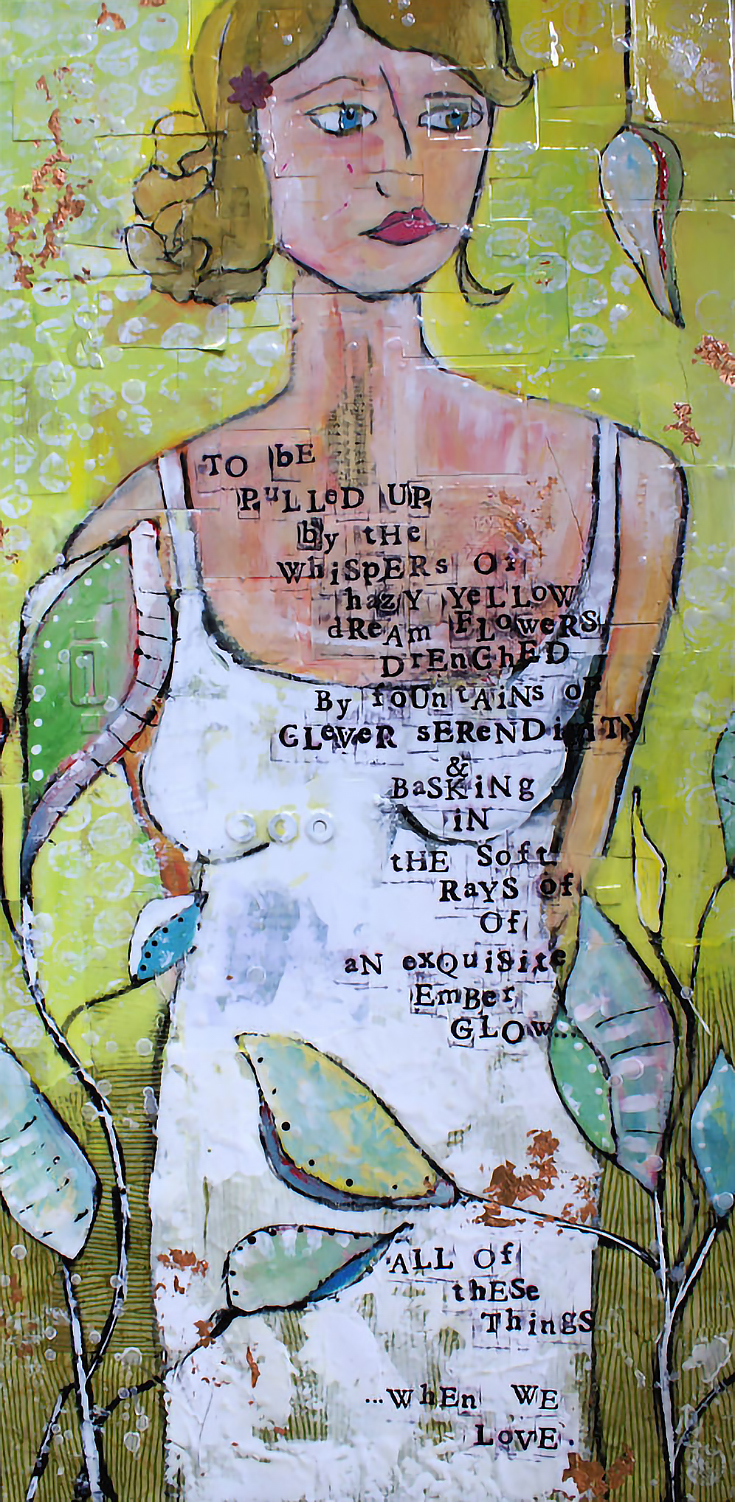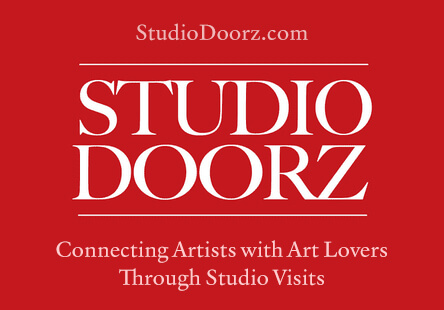 Cindy Wunsch had a successful career in the music industry but left it behind in order to re-connect with her inner child and develop an artistic career of her own.
Cindy Wunsch had a successful career in the music industry but left it behind in order to re-connect with her inner child and develop an artistic career of her own.
Over the past four years since Cindy became a full-time professional artist, she’s come to realize that creating art gives her a chance to express herself in a way that allows her to put a little joy in the world.
Alyice: Prior to becoming an artist, you were quite successful in the music industry. Why did you want to switch gears?
Cindy: The music business was an industry where I could use my creative skills to help recording artists manage their careers, but it was not a place where I could be free in my own artistic muses.
I was having a wonderful time being an artist manager, but something was pulling at me to explore the bigger picture of my life.
I actually left the music business to pursue my Masters Degree in Education. I earned that degree and taught elementary school art for a few years. While teaching, I unconsciously wiped away all the pretense of my former career and became reconnected to my inner child. I believe that is what brought out the art and the words in my work.
Looking back, I can’t believe I ever did anything else. My work as an artist has become the tool to opening my heart and my mind and it keeps me asking myself all of life’s important questions.
Alyice: It has been said that from the moment you wanted to be a full-time artist, you knew you had to protect your name, how did you go about doing this?
Cindy: Well, it helps that my significant other is a lawyer who does a lot of work in the area of copyright infringement. He was the one who recommended that I do it.
I filed the paperwork to the United States Trademark Office and protected “Studio BE” in the business categories that I was operating in (or wanted to). The cost is not cheap but it is an important part of doing business if you plan on taking it seriously. I also protected the names for internet usage—sometimes you have to protect them in all the “endings”—.com, .net etc. It is a good idea to protect YOUR name and the company name as well.
Alyice: How long after you made art your full-time career, did you know you wanted to license your art?
Cindy: This step for me happened a bit organically.
I didn’t even consider the possibility until I knew more about the business. I started wholesaling my art first through national showrooms. I became a manufacturer and filled orders as they came in from all parts of the country. I enjoyed this part of the business at first, but then it became really hard to continue to fund new items and outsource products.
I then started to understand how licensing worked, and knew this would be a nice addition to the many streams of income of an artist. I liken it to the music business in many ways—a recording artist has royalty income, record sales, touring, endorsements etc.
Licensing is just a piece of that pie. There are many types of licensing companies, the most important part for me was finding a creative partner that understood my art and my mission statement as an artist and human being.
Demdaco is an amazing company (in my opinion the best in this industry) with great vision and leadership. I wanted to license my art, but I wanted to stay true to my intent for my artwork and its message. To have Demdaco choose me as a licensee really helped validate me as an artist. It was quite a feeling to see my product line come out and be so grandly presented in all of their showrooms. I have much gratitude for the experience!
Alyice: Once you knew you wanted to license your art, how long did it take you to start seeking licensing agreements?
Cindy: I started becoming familiar with licensing companies when I started my wholesale line and spent time at Market in Atlanta, Dallas and Chicago.
I started asking questions and going into showrooms to do research about various companies, and it did not take long to isolate Demdaco as THE company that I wanted to license with.
I sent them a package of all of my products with a solicitation letter and I heard from them immediately. However, they had already signed their artists for the next few years.
When they finally contacted me again, it was probably a year or so after I sent the letter and it took another year to get my line developed in all of the categories.
Alyice: It’s been said that licensing one’s art means an artist is “working smarter, not harder.” Has this been your experience?
Cindy: I am not sure I fully believe that statement. I simply think that licensing is a choice. Some artists would never even consider licensing.
In my opinion it is a wonderful way to maximize exposure for a single image. Some art styles lend themselves to licensing for the gift market better than others. My art just seemed the perfect fit. For some artists it is a substantial income stream. I am proud to be a licensed artist and it does help support other areas of my business!
Alyice: How can artists educate themselves so that they don’t get taken advantage of?
Cindy: I think it is important that you maintain some kind of creative control; being very specific in the contract as to what kinds of things that you would be willing to have your artwork on.
Also, if you are going to do this, choose a reputable company. Talk to other licensors that have worked with the company and find out what their experiences have been.
If you are approached by a licensor, it is highly likely you are being looked at by several companies so don’t be afraid to examine all of the opportunities out there.
I don’t think these companies have the desire to take advantage of artists, I just think that some of them have a more honest experience. In addition, it seems that there is an industry standard related to the royalty rate so if something comes in way under or way over, be cautious of that.
Alyice: Before you go, what’s the coolest art tip you’ve ever received?
Cindy: Be brave and start anywhere.
You can learn more about Cindy and her art at www.cindywunsch.com.
This post may contain affiliate links.



